Bctb - Study guides, Class notes & Summaries
Looking for the best study guides, study notes and summaries about Bctb? On this page you'll find 12 study documents about Bctb.
All 12 results
Sort by
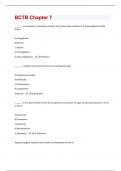
-
BCTB Chapter 7 Questions And Answers Graded A+
- Exam (elaborations) • 24 pages • 2024
- Available in package deal
-
- $7.99
- + learn more
_______ are secreted or membrane proteins that contain large numbers of O-linked oligosaccharide chains A) Gangliosides B) Mucins C) Glycins D) Aminoglycans E) Immunoglobulins - B) Mucins _______ could be used to determine human blood group type A) Lipopolysaccharides B) Globoside C) Glycoproteins D) Lipoproteins E) Mucins - B) Globoside _______ is the determination of the full component and function of sugar-containing molecules in a cell or tissue A) Genomics B) Proteomics C) ...
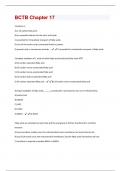
-
BCTB Chapter 17 Questions And Answers With Latest Quiz
- Exam (elaborations) • 24 pages • 2024
- Available in package deal
-
- $7.99
- + learn more
Carnitine is: A) a 15-carbon fatty acid. B) an essential cofactor for the citric acid cycle. C) essential for intracellular transport of fatty acids. D) one of the amino acids commonly found in protein. E) present only in carnivorous animals. - C) essential for intracellular transport of fatty acids. Complete oxidation of 1 mole of which fatty acid would yield the most ATP? A) 16-carbon saturated fatty acid B) 18-carbon mono-unsaturated fatty acid C) 16-carbon mono-unsaturated fatty aci...
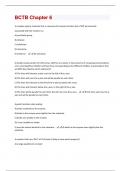
-
BCTB Chapter 6 Questions And Answers With Verified Quiz
- Exam (elaborations) • 20 pages • 2024
- Available in package deal
-
- $7.99
- + learn more
A complex organic molecule that is necessary for enzyme function but is NOT permanently associated with the enzyme is a: A) prosthetic group. B) cofactor. C) holofactor. D) coenzyme. E) metal ion. - D) coenzyme. A double-reciprocal plot of 1/V0 versus 1/[S] for an enzyme in the presence of increasing concentrations of an uncompetitive inhibitor will have lines corresponding to the different inhibitor concentrations that are BEST described by which statement? A) The lines will intersect...
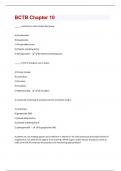
-
BCTB Chapter 10 Questions And Answers With Verified Quiz
- Exam (elaborations) • 23 pages • 2024
- Available in package deal
-
- $7.99
- + learn more
_____ contain(s) an ether-linked alkyl group. A) Cerebrosides B) Gangliosides C) Phosphatidyl serine D) Platelet-activating factor E) Sphingomyelin - D) Platelet-activating factor _____ is NOT a biological use of waxes. A) Energy storage B) Lubrication C) Structure D) Insulation E) Waterproofing - D) Insulation A compound containing N-acetylneuraminic acid (sialic acid) is: A) cardiolipin. B) ganglioside GM2. C) phosphatidylcholine. D) platelet-activating factor. E) sphingomyeli...
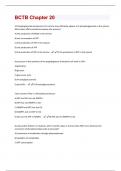
-
BCTB Chapter 20 Questions And Answers With Verified Quiz
- Exam (elaborations) • 17 pages • 2024
- Available in package deal
-
- $7.99
- + learn more
3-Phosphoglycerate produced in the stroma may ultimately appear as 3-phosphoglycerate in the cytosol. What other effects would accompany this process? A) the production of NADH in the stroma B) net consumption of ATP C) the production of ATP in the cytosol D) net production of ATP E) the production of ATP in the stroma - C) the production of ATP in the cytosol A precursor in the synthesis of the peptidoglycan of bacterial cell walls is UDP-: A) galactose. B) glucose. C) glucuronic acid...
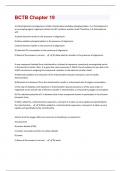
-
BCTB Chapter 19 Questions And Answers Graded A+
- Exam (elaborations) • 20 pages • 2024
- Available in package deal
-
- $7.99
- + learn more
2,4-Dinitrophenol and oligomycin inhibit mitochondrial oxidative phosphorylation. 2,4- Dinitrophenol is an uncoupling agent; oligomycin blocks the ATP synthesis reaction itself. Therefore, 2,4-dinitrophenol will: A) allow electron transfer in the presence of oligomycin. B) allow oxidative phosphorylation in the presence of oligomycin. C) block electron transfer in the presence of oligomycin. D) diminish O2 consumption in the presence of oligomycin. E) None of the answers is correct. - A) ...
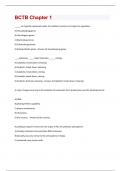
-
BCTB Chapter 1 Questions And Answers Graded A+
- Exam (elaborations) • 20 pages • 2024
- Available in package deal
-
- $7.99
- + learn more
_____ are typically expressed under all conditions and are not subject to regulation. A) Housekeeping genes B) Homologous genes C) Bacterial genomes D) Eukaryotic genomes E) Endosymbiotic genes - Answer-A) Housekeeping genes ____pathways _____ large molecules, _____ energy. A) Catabolic; break down; releasing B) Anabolic; break down; releasing C) Catabolic; break down; storing D) Anabolic; break down; storing E) Anabolic; build up; releasing - Answer-A) Catabolic; break down; releasin...
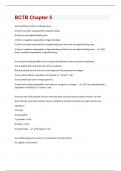
-
BCTB Chapter 5 Questions And Answers With Latest Quiz
- Exam (elaborations) • 21 pages • 2024
- Available in package deal
-
- $7.99
- + learn more
A Hill coefficient (nH) of 2 indicates that: A) there is positive cooperativity in ligand binding. B) there are two ligand-binding sites. C) there is negative cooperativity in ligand binding. D) there is positive cooperativity in ligand binding and there are two ligand-binding sites. E) there is negative cooperativity in ligand binding and there are two ligand-binding sites. - A) there is positive cooperativity in ligand binding. A monoclonal antibody differs from a polyclonal antibody in...
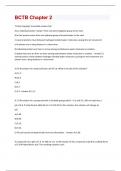
-
BCTB Chapter 2 Questions And Answers Graded A+
- Exam (elaborations) • 18 pages • 2024
- Available in package deal
-
- $7.99
- + learn more
"Proton hopping" essentially means that: A) an individual proton "jumps" from one electronegative group to the next. B) a free proton moves from one hydroxyl group of ionized water to the next. C) several protons move between hydrogen bonded water molecules causing the net movement of a photon over a long distance in a short time. D) individual protons are freer to move among and between water molecules in solution. E) hydronium ions are freer to move among and between water molecules ...
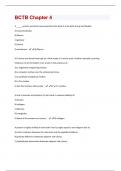
-
BCTB Chapter 4 Questions And Answers With Latest Quiz
- Exam (elaborations) • 19 pages • 2024
- Available in package deal
-
- $7.99
- + learn more
A _____ protein will often have properties that allow it to be both strong and flexible. A) macromolecular B) fibrous C) globular D) helical E) membrane - B) fibrous A D-amino acid would interrupt an a helix made of L-amino acids. Another naturally occurring hindrance to the formation of an a helix is the presence of: A) a negatively charged Arg residue. B) a nonpolar residue near the carboxyl terminus. C) a positively charged Lys residue. D) a Pro residue. E) two Ala residues side b...

Study stress? For sellers on Stuvia, these are actually golden times. KA-CHING! Earn from your study resources too and start uploading now. Discover all about earning on Stuvia


